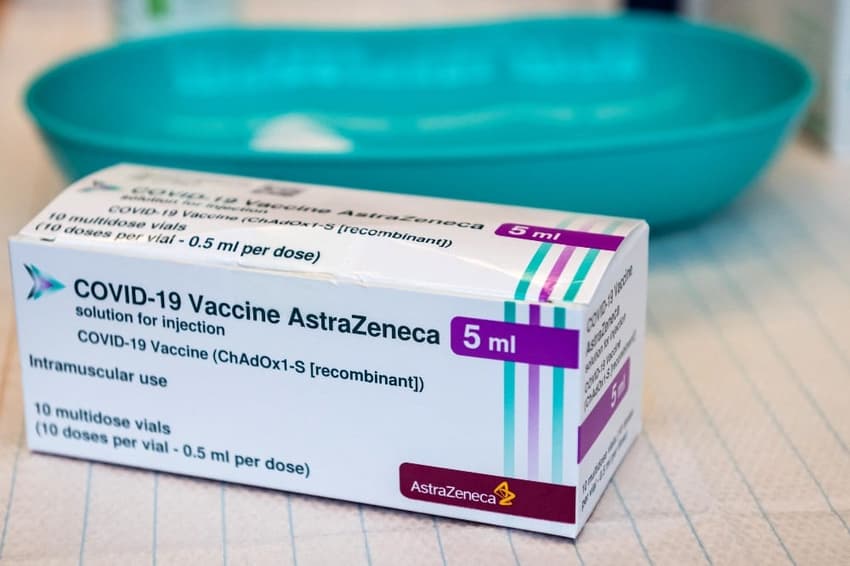Norwegian experts conclude 'strong immune response' from AstraZeneca vaccine linked to blood clots

A group of medical experts at Oslo University Hospital said on Thursday that blood clots in three health workers who took the AstraZeneca vaccine were triggered by an immune system response.
Three health care workers under the age of 50 were admitted to hospital with severe blood clots after taking the vaccine. One of the three later died of a brain haemorrhage.
“We have found the cause. There is nothing but the vaccine that can explain the immune reaction that occurred,” Pål Andre Holme, professor and chief physician at Oslo University Hospital told newspaper VG.
Holme led a team that worked round the clock to find out why the health workers, who were all aged under 50, were admitted to hospital with blood clots after taking the vaccine.
Now they believe they have confirmed a theory that there was an immune system reaction associated with the vaccine.
"Our theory that this is a strong immune response which with high probability came after the vaccine has been found," Holme said.
“In collaboration with (the specialist department for blood clots) at the University Hospital of North Norway (UNN), we have now proved that it is specific anti-bodies against platelets that can give the outcome that we have seen elsewhere in medicine, and with medication as the triggering cause,” he continued.
READ ALSO: Norway health official counters AstraZeneca over vaccine safety statement
The specialist also said that there was "no other medical history in these patients that could give such a strong immune response". He stressed that antibodies in general are not the cause of the problem, which involves "very specific" antibodies.
The reaction in the cases in question involved blood clots and a lack of platelets, VG writes.
When asked if he thinks the findings mean that the vaccination should be stopped, Holme said that this was up to Norwegian Medicines Agency to decide.
“I have no idea about that, it is not me who should assess it,” he said according to Aftenposten.
Norway has already suspended the use of the AstraZeneca vaccine. So far Norway has vaccinated 120,000 people with the AstraZeneca vaccine.
The European Medicines Agency (EMA) is expected to present its assessment of the vaccine at 5pm on Thursday, after several countries in the EU suspended its use. One of the assessments that the EMA must decide on is whether they will withdraw the approval of the vaccine for use.
The Norwegian Medicines Agency is waiting on the EMA´s Assessment before commenting, VG reports. AstraZeneca, the manufacturer of the vaccine, also declined to immediately comment on the matter.
“We are awaiting the EMA's decision later today,” AstraZeneca's head of media communications Christina Malmberg Hägerstrand told news agency NTB.
Comments
See Also
Three health care workers under the age of 50 were admitted to hospital with severe blood clots after taking the vaccine. One of the three later died of a brain haemorrhage.
“We have found the cause. There is nothing but the vaccine that can explain the immune reaction that occurred,” Pål Andre Holme, professor and chief physician at Oslo University Hospital told newspaper VG.
Holme led a team that worked round the clock to find out why the health workers, who were all aged under 50, were admitted to hospital with blood clots after taking the vaccine.
Now they believe they have confirmed a theory that there was an immune system reaction associated with the vaccine.
"Our theory that this is a strong immune response which with high probability came after the vaccine has been found," Holme said.
“In collaboration with (the specialist department for blood clots) at the University Hospital of North Norway (UNN), we have now proved that it is specific anti-bodies against platelets that can give the outcome that we have seen elsewhere in medicine, and with medication as the triggering cause,” he continued.
READ ALSO: Norway health official counters AstraZeneca over vaccine safety statement
The specialist also said that there was "no other medical history in these patients that could give such a strong immune response". He stressed that antibodies in general are not the cause of the problem, which involves "very specific" antibodies.
The reaction in the cases in question involved blood clots and a lack of platelets, VG writes.
When asked if he thinks the findings mean that the vaccination should be stopped, Holme said that this was up to Norwegian Medicines Agency to decide.
“I have no idea about that, it is not me who should assess it,” he said according to Aftenposten.
Norway has already suspended the use of the AstraZeneca vaccine. So far Norway has vaccinated 120,000 people with the AstraZeneca vaccine.
The European Medicines Agency (EMA) is expected to present its assessment of the vaccine at 5pm on Thursday, after several countries in the EU suspended its use. One of the assessments that the EMA must decide on is whether they will withdraw the approval of the vaccine for use.
The Norwegian Medicines Agency is waiting on the EMA´s Assessment before commenting, VG reports. AstraZeneca, the manufacturer of the vaccine, also declined to immediately comment on the matter.
“We are awaiting the EMA's decision later today,” AstraZeneca's head of media communications Christina Malmberg Hägerstrand told news agency NTB.
Join the conversation in our comments section below. Share your own views and experience and if you have a question or suggestion for our journalists then email us at [email protected].
Please keep comments civil, constructive and on topic – and make sure to read our terms of use before getting involved.
Please log in here to leave a comment.